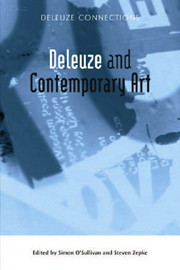Book contents
- Frontmatter
- Contents
- Acknowledgements
- List of Illustrations
- Introduction: Deleuze and Guattari and Contemporary Art
- POLITICS
- 1 The Politics of the Scream in a Threnody
- 2 A Shift Towards the Unnameable
- 3 The Heterogenesis of Fleeing
- 4 Anita Fricek: Contemporary Painting as Institutional Critique
- THE AESTHETIC PARADIGM
- SCENES AND ENCOUNTERS
- TECHNOLOGIES
- Notes on Contributors
- Index
2 - A Shift Towards the Unnameable
from POLITICS
Published online by Cambridge University Press: 12 September 2012
- Frontmatter
- Contents
- Acknowledgements
- List of Illustrations
- Introduction: Deleuze and Guattari and Contemporary Art
- POLITICS
- 1 The Politics of the Scream in a Threnody
- 2 A Shift Towards the Unnameable
- 3 The Heterogenesis of Fleeing
- 4 Anita Fricek: Contemporary Painting as Institutional Critique
- THE AESTHETIC PARADIGM
- SCENES AND ENCOUNTERS
- TECHNOLOGIES
- Notes on Contributors
- Index
Summary
West of Tordesillas, metaphor has no value of its own. It is not that I dislike metaphor. I want all works to be seen some day not as objects for sterile flights of fancy, but as marks, memories, and evocations of real and visible conquests.
Cildo MeirelesHaving decided to experience Cildo Meireles' Red Shift, I take the first available flight to Belo Horizonte. Arriving at Inhotim, I head straight for the work, installed in a building especially constructed for the installation and conceived by the artist himself. A fourth wall has been added to the structure that did not exist in previous versions, which allows a separation from the external space. This is no trifling matter; free from the distracting murmur of exhibitions and with no time limit, I enter the installation, shut the door and let myself go.
First environment: furniture, domestic appliances, carpets, paintings, but also porcelain penguins on a fridge, fish in an aquarium, parakeet in a cage, and all types of knick-knacks and trinkets cluttering the space. Not to mention an LP spinning endlessly on the turntable, a constantly illuminated television and just a few books, all pompously bound, displayed on the shelf as if they too were trinkets. Signs of the passion for consumption propelled by industrial modernity, mingled with nostalgia for everyday objects of pre-modern existence. Were it not for a computer, this would be a typical Brazilian middle-class living room of the 1960s and ’70s. An ordinary scene of ordinary lives.
- Type
- Chapter
- Information
- Deleuze and Contemporary Art , pp. 34 - 42Publisher: Edinburgh University PressPrint publication year: 2010



